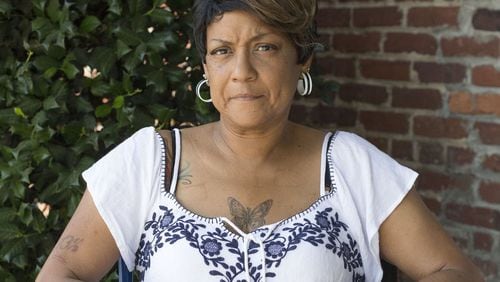When former prison inmate Kimery Finger nicked her toe while trimming her nails, it shouldn’t have been a big deal. But the small cut on her big right toe slowly turned into a blister, then a black spot and eventually an oozing sore.
Four months later, doctors would be forced to amputate Finger’s lower right leg. The amputation could have been prevented but shoddy medical care at Pulaski State Prison allowed the infection to reach her bones, despite her repeatedly asking prison medical staff for care, documents and medical records obtained by The Atlanta Journal-Constitution allege.
Finger, a 51-year-old diabetic, was hospitalized in Hawkinsville, where the prison is located, last August in the final days of a 1-year sentence for credit card theft and financial identity fraud. She was discharged the day after her sentence ended even though doctors noted in her medical file that the infection in her toe was by then also in her blood.
With prescriptions in hand but no way to fill them, Finger was given street clothes and $25 and put on a bus to Atlanta. Three days later, on Aug. 24, she was at Grady Memorial Hospital, preparing to have her big toe amputated. Doctors took her leg a month later.
“This did not have to happen. It could have been prevented,” Finger said a Grady doctor told her. “I just didn’t want to die.”
Finger plans to file suit but first had to provide written notice outlining the allegations, following a Georgia law designed to give local or state government agencies time to take steps to avoid litigation.
It was in her notice that Finger alleged the sub-par treatment she received at Pulaski. Her story reflects broader troubles of poor medical care for dozens of inmates at the prison brought to light by an AJC investigation.
Preventable infection takes hold
The AJC stories, lawsuits and a subsequent study by Augusta University, which staffs prison medical clinics, criticized the care Dr. Yvon Nazaire, the prison's former medical director, provided inmates.
Finger was one of his patients.
As a diabetic, Finger is more prone than otherwise healthy people to develop skin conditions. But serious medical problems can be prevented and easily treated if caught early, according to the American Diabetes Association. Diabetics must pay special attention to their feet, the association says, because “even ordinary problems can get worse and lead to serious complications.”
In prison, inmates have to make a written request to see a doctor, nurse or physician assistant. It could be days or weeks before they get a response.
That was Finger’s experience.
At her first appointment, a “dry dressing” was applied to the wound, her medical records show. Three weeks later, medical staff prescribed Finger “shower shoes” and told her to monitor the blister.
Less than a week later, on June 18, 2015, Nazaire saw her and decided she should wear "soft" shoes instead of prison-issued boots. He didn't provide any other care, according to the letter and records. Nazaire was fired last September for misrepresenting his credentials, not because of the quality of medical care he delivered.
Finger’s wound continued to worsen. A couple of weeks later, staff treated the “open lesion” with medicine and changed the dressing but ordered no follow-up.
On July 29, two months after the cut became a blister, another doctor requested an “urgent” podiatry consultation because of “slight oozing.” A culture taken when she saw the podiatrist on Aug. 11, 2015, revealed Finger had a potentially deadly staph infection.
She was hospitalized five days later at Taylor Regional Hospital. But when Finger’s prison sentence ended Aug. 20, the hospital discharged her the next day with instructions to follow up “with outpatient surgery.”
Hospital spokeswoman Jenna Womble said Finger was not discharged because the state was no longer responsible for her bills and she didn’t have money for her medical expenses.
“We don’t discharge patients based on financial circumstances,” Womble said.
‘Left to fester due to negligence’
Finger came to Atlanta.
By the time she was admitted into Grady on Aug. 24, her toe was beyond saving. She also had not had any insulin since she left the hospital in Hawkinsville four days earlier.
The big toe on her right foot was amputated a few days later.
Another month passed before Grady doctors determined removing her toe was not enough. There was a “foul smell” and her right foot was “necrotic, with gangrene.”
The second amputation was performed in late September.
“The preventable wound and treatable infection were left to fester due to the negligence of the Pulaski State Prison,” Finger’s attorneys, Jeff Helms and James Douglas, wrote in the letter asking for $1 million. “Now, Ms. Finger lost her right leg below the knee.”
The Department of Corrections declined to comment because of the possibility of litigation.
‘Mentally, it’s devastating’
Finger is just one of many imprisoned women who say they received substandard medical care. The current and former female inmates at Pulaski primarily blame Nazaire, who could not be reached for comment.
Augusta University, which provides medical care to the prison through a subsidiary, Georgia Corrections Health Care, released a report last December that said the poor medical care Nazaire gave three inmates contributed to their deaths.
Since then, Georgia Corrections Health Care has implemented many of the recommendations in the report, which was prompted by the AJC investigations into the deaths, according to a spokesman. Nazaire was fired before the report was released.
That report was completed four months after Finger was released from prison and discharged from Taylor Regional Hospital.
“It was like I haven’t been free,” Finger said, adding that her disability has cost her relationships. “Mentally, it’s devastating.”
And sometimes Finger feels pain where there is no leg.
“You still feel your limb,” she said. “This thing hurts so much and it’s not there.”






